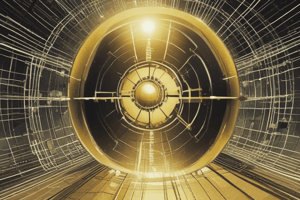Podcast
Questions and Answers
What is a core principle of pragmatism?
What is a core principle of pragmatism?
- Focus on emotional interpretation
- The pursuit of abstract theories
- Recognition of practical consequences (correct)
- Emphasis on historical significance
Who discovered radioactivity and in what year?
Who discovered radioactivity and in what year?
- Marietta Blau in 1936
- Marie Curie in 1898
- Henri Becquerel in 1896 (correct)
- Albert Einstein in 1905
What concept is foundational to nuclear physics?
What concept is foundational to nuclear physics?
- Thermodynamics
- Electromagnetism
- Quantum theory
- Radioactivity (correct)
The concept of half-life relates to which phenomenon?
The concept of half-life relates to which phenomenon?
Which of the following statements best describes the implications of radioactivity?
Which of the following statements best describes the implications of radioactivity?
What is the primary purpose of radar technology?
What is the primary purpose of radar technology?
Who conducted the early experiments that contributed to the development of radar?
Who conducted the early experiments that contributed to the development of radar?
In which decade did Heinrich Hertz's work on electromagnetic radiation take place?
In which decade did Heinrich Hertz's work on electromagnetic radiation take place?
What type of waves does radar utilize for object detection?
What type of waves does radar utilize for object detection?
Which of these is NOT a characteristic of radar systems?
Which of these is NOT a characteristic of radar systems?
What significant discovery did Vesto Slipher make regarding distant galaxies?
What significant discovery did Vesto Slipher make regarding distant galaxies?
How did Edwin Hubble contribute to the understanding of the universe's expansion?
How did Edwin Hubble contribute to the understanding of the universe's expansion?
What is redshift primarily indicative of in the context of galaxies?
What is redshift primarily indicative of in the context of galaxies?
Which of the following statements about Hubble's findings is incorrect?
Which of the following statements about Hubble's findings is incorrect?
What phenomenon did Slipher's detection of redshift help to confirm?
What phenomenon did Slipher's detection of redshift help to confirm?
What is Lawrence primarily known for in the field of physics?
What is Lawrence primarily known for in the field of physics?
What crucial problem did Lawrence solve with his invention?
What crucial problem did Lawrence solve with his invention?
What application of Lawrence's work is mentioned?
What application of Lawrence's work is mentioned?
Who is recognized for creating the world's first nuclear reactor?
Who is recognized for creating the world's first nuclear reactor?
Which of the following physicists contributed significantly to nuclear physics?
Which of the following physicists contributed significantly to nuclear physics?
What is chemical bonding primarily concerned with?
What is chemical bonding primarily concerned with?
What does electronegativity measure?
What does electronegativity measure?
Who is known for introducing the concept of electronegativity?
Who is known for introducing the concept of electronegativity?
Which statement is incorrect regarding chemical bonding?
Which statement is incorrect regarding chemical bonding?
Which of the following best describes a key consequence of high electronegativity in an atom?
Which of the following best describes a key consequence of high electronegativity in an atom?
Flashcards are hidden until you start studying
Study Notes
Pragmatism
- Focuses on practical consequences and real-world effects to determine meaning and truth.
Discovery of Radioactivity
- Henri Becquerel discovered radioactivity in 1896.
- His discovery demonstrated that atoms can emit energy, changing their form.
- This laid the foundation for nuclear physics and the concept of half-life.
Development of Radar and Sonar
- Radar uses electromagnetic waves to remotely detect objects.
- It originated from Heinrich Hertz's experiments on electromagnetic radiation in the late 1880s.
Extragalactic Redshift
- Vesto Slipher discovered redshift in the light from distant galaxies.
Hubble's Law
- Edwin Hubble established a correlation between redshift and distance, confirming the universe's expansion.
Linus Pauling
- Famous for his work on chemical bonding.
- Introduced the concept of electronegativity, measuring an atom's ability to attract electrons in a chemical bond.
Ernest Lawrence
- American physicist known for his work in nuclear physics.
- Invented the cyclotron, solving the problem of accelerating particles to high energies.
- His work led to various applications, including medical diagnosis and treatment.
Enrico Fermi
- Italian physicist who created the world's first nuclear reactor.
Studying That Suits You
Use AI to generate personalized quizzes and flashcards to suit your learning preferences.




